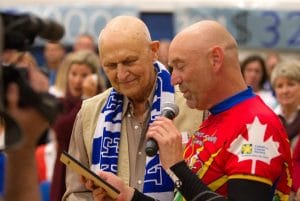Born in Holland, Hoenson volunteered for the Royal Netherlands Army two days after Japan bombed Hawaii’s Pearl Harbor. He was 18, and was sent to join his country’s forces in the Dutch East Indies (now Indonesia). Within weeks the Dutch were overwhelmed by the Japanese, and he was one of more than 500 Dutch soldiers taken prisoner. They were eventually shipped to Japan and forced into slave labor at the Mitsubishi Shipyard in Nagasaki. After three and a half years of captivity, he had lost more than 80 pounds — and he was only 160 to start with. More than 300 of his fellow soldiers had died by then. While being forced to clean up debris from an air raid the day before, he heard a plane in the sky, which only dropped one bomb. It was August 9, 1945, at 2 minutes after noon. That one bomb was “Fat Man” — an atomic bomb; “Little Boy” had been dropped on Hiroshima three days earlier.

When he found out the students had raised $93,000 for the Canadian Cancer Society, he wrote a check for $7,000 to make it an even 100 thou. (Canadian Cancer Society)
Hoenson, who was about a mile from ground zero, was thrown to the ground by the blast, but beside minor burns was not injured. He was put back to work: “I remember spending days gathering up bodies, piece by piece.” Japan surrendered six days after the blast, and American soldiers streamed into the area. Hoenson had one very fond memory of that: he had never been allowed to bathe, but “the U.S. soldiers picked us up and they set up a tent full of sprinklers and washed us down. The water was running over me, I was like an old fool, I was crying. It was unbelievable that it was three years without.” After several years in Holland recovering from radiation sickness, Hoenson moved to Calgary, Canada, married a schoolteacher, got a job as a geological draftsman for an oil company, and carefully invested their two salaries. Though he continued to have nightmares over his time in Japan, his primary philosophy was gratitude: he found a job, a wife, and a welcoming country. “What else do you want?” And, he said, “I have no hard feelings against the Japanese.”
Hoenson and his wife Sylvia retired and moved to Victoria, B.C., in 1979. When Sylvia died in 2008, he started giving the investment proceeds away: millions to hospitals, the B.C. Cancer Foundation, and more than $1 million to the Veterans Memorial Lodge at Broadmead, in Victoria. “My own values are few,” he once told a reporter. “Try to cheer up people you meet, a smile, a remark, be helpful. Try to follow the rules of the olden days, of opening the door for a lady, getting up for a lady, pulling out her chair, let her go first. I was brought up that way, and I have always done it and still do it.” And, he added, “Don’t dwell on the past, except for keeping the memories of the love of your life. Be happy and share it!” Hoenson fell at his home, and was hospitalized for two months. Upon release he moved to the Veteran’s Lodge at Broadmead. The next day, May 27, he died. He was 96.
